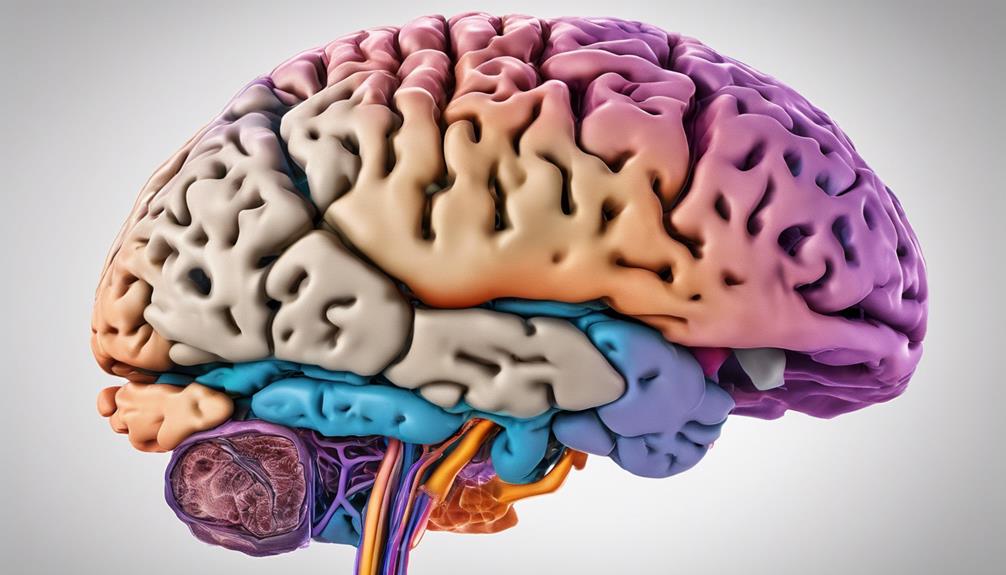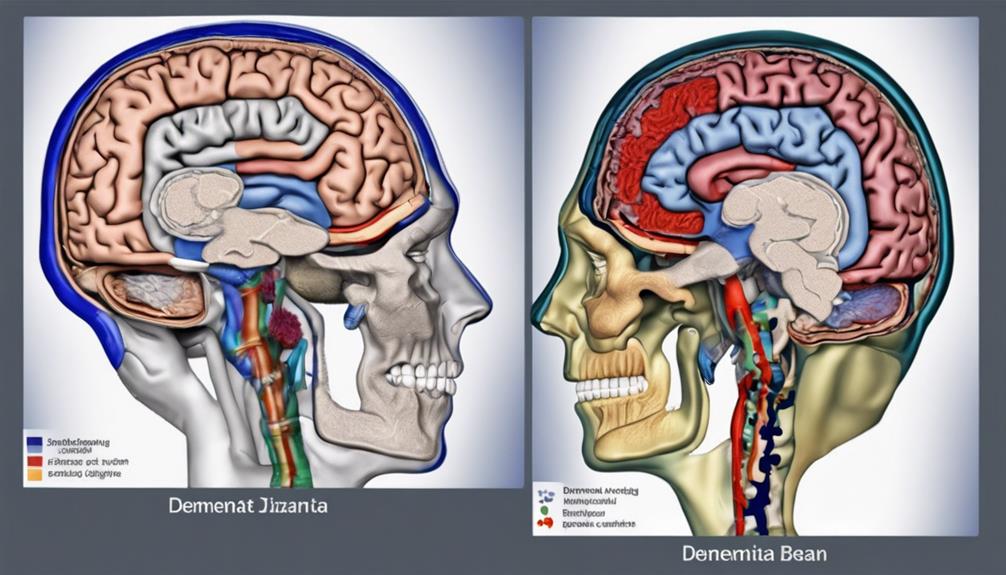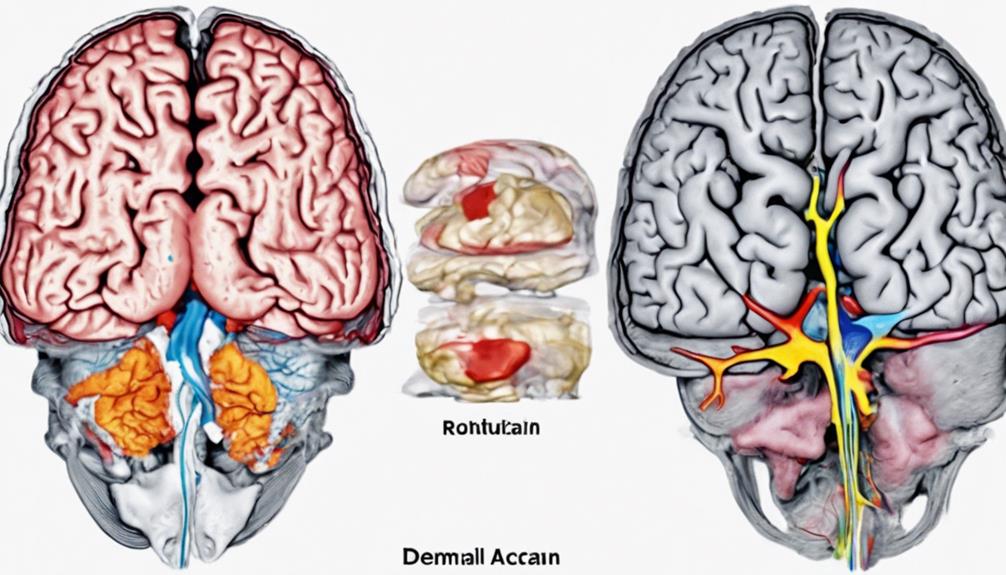Dementia Care
Ensuring Hospice Qualifications Meet Dementia Needs
On the journey to understanding hospice qualifications for dementia, the maze of criteria unveils a compassionate approach, revealing essential insights.

Navigating the criteria for hospice eligibility with dementia can feel akin to traversing a maze, entwined with detailed and subtle evaluations that create a complex tapestry.
Understanding the specific criteria that determine eligibility for hospice care in dementia patients is crucial for ensuring appropriate support and services are provided.
By shedding light on the intricacies of these qualifications, we can gain a deeper insight into the compassionate care and specialized attention tailored to individuals facing the challenges of advanced dementia.
Key Qualifications for Hospice Care
When considering key qualifications for hospice care for individuals with dementia, it's essential to assess specific criteria to ensure their eligibility for specialized services. For patients in the end-stage of Alzheimer's disease, the inability to walk without assistance, incontinence of bowel and bladder, and difficulty swallowing or refusal to eat are crucial factors in determining eligibility for hospice care. Additionally, the inability to speak or communicate meaningfully is a significant consideration in meeting the criteria for specialized dementia care. Coexisting conditions such as aspiration pneumonia, recurrent infections, and severe malnutrition can further support a patient's eligibility for hospice services, focusing on symptom management and improving overall quality of life.
In hospice care for dementia patients, access to nursing care, home health aides, social services, spiritual care, and volunteer support is provided to enhance the patient's well-being. This comprehensive approach not only benefits the patient but also extends professional support to caregivers, offering respite care and follow-up assistance even after the patient's passing, all covered by Medicare, Medicaid, and most private insurances.
Understanding Dementia Hospice Eligibility

To better grasp the qualifications for hospice care tailored to individuals with dementia, understanding the eligibility criteria is paramount in ensuring comprehensive end-of-life support. Dementia patients may qualify for hospice care when facing challenges like communication difficulties, incontinence, swallowing issues, and the need for assistance with basic activities like walking.
Hospice services for these individuals encompass a range of support, including nursing care, personal assistance, social services, spiritual guidance, and volunteer aid. The benefits of hospice care for dementia patients extend to professional caregiver support, coverage by Medicare, Medicaid, and most private insurances, respite for primary caregivers, and access to complementary therapies.
In the case of end-stage dementia, hospice care can offer comfort and dignity in the final stages of life. Angel Health, a reputable hospice provider, offers resources and assistance tailored to the specific needs of dementia patients, ensuring compassionate care and support during this challenging time.
Criteria for Dementia Hospice Admission
In considering admission to hospice for individuals with dementia, several criteria are evaluated to determine eligibility for specialized end-of-life care. When assessing the eligibility criteria for dementia hospice admission, we look at various aspects that indicate the terminal nature of the illness and the need for comprehensive care. Here are some key factors considered:
- Activities of Daily Living: Inability to perform essential tasks like ambulating, dressing, bathing, and communicating effectively.
- Nutritional Status: Impaired nutritional indicators such as weight loss, low BMI, and albumin levels.
- Co-morbid Conditions: Presence of additional health issues like cardiovascular disease, COPD, and diabetes affecting the patient's condition.
These criteria help us understand the progression of the disease, the expected life expectancy, and the level of support needed from family caregivers. By evaluating these factors, we can ensure that individuals with dementia receive the appropriate hospice care, including necessary medical supplies and support tailored to their specific needs.
Hospice Support for Dementia Patients

For dementia patients in need of specialized end-of-life care, hospice support offers a compassionate approach to addressing symptoms and enhancing quality of life. Hospice care for dementia patients focuses on palliative care to improve their comfort and well-being. The multidisciplinary hospice team provides emotional support not only for the patients but also for their families, helping them navigate the challenges of caring for a loved one with dementia.
Dementia patients may become eligible for hospice based on a decline in physical and mental function, communication issues, and increased nursing care needs. Specialist care tailored to the unique needs of dementia patients, including addressing cognitive impairment and comorbid conditions, is a key aspect of hospice support. Additionally, hospice care offers family-centered services to involve and support the patient's loved ones.
Emotional support is a crucial component of hospice care for dementia patients, recognizing the challenges and stress that families may experience. Respite care is also available to provide caregivers with temporary relief and support.
Navigating Hospice Care for Dementia
Navigating hospice care for dementia patients requires a comprehensive understanding of their unique needs and challenges to ensure tailored support and comfort throughout their end-of-life journey. When considering hospice care for individuals with dementia, it's crucial to assess various factors to provide the best possible care:
- Communication Abilities: Understanding the patient's ability to communicate their needs and preferences is essential for personalized care.
- Functional Abilities: Evaluating impaired functional abilities such as ambulation, dressing, bathing, and more helps in determining the level of assistance required.
- Nutritional Status: Monitoring indicators like weight loss, low BMI, and albumin levels is vital to address malnutrition issues promptly.
Frequently Asked Questions
What Qualifies a Dementia Patient for Hospice?
When considering hospice for a dementia patient, various factors come into play. In our experience, the need for hospice care is determined by the patient's overall condition and specific criteria.
Evaluating their ability to ambulate, manage daily tasks, and nutritional status are crucial. Additionally, coexisting health issues can impact eligibility for hospice support.
Our team is here to assess these aspects compassionately and make informed decisions to provide the best care possible.
What Dementia Score Is Needed for Hospice Care?
When it comes to determining hospice care eligibility for dementia patients, the FAST score is crucial. This score reflects the functional decline in individuals with dementia, with higher scores indicating more significant impairment.
It serves as a valuable tool in assessing the need for specialized care like hospice. Consulting with healthcare providers can help determine if a dementia patient meets the FAST score criteria for hospice care.
When Should Someone With Dementia Go Into a Care Home?
When someone with dementia should go into a care home depends on several factors such as safety concerns, need for supervision, caregiver burnout, challenging behaviors, and specialized care services. Evaluating these aspects can help determine when transitioning to a care home is necessary for the individual's well-being and quality of life.
It's essential to consider all these factors before making the decision to ensure the person with dementia receives the appropriate support and care.
What Is the Life Expectancy of a Person With Dementia in Hospice?
We understand the concern around the life expectancy of individuals with dementia in hospice care. It's essential to acknowledge that each person's journey is unique, and various factors can influence their prognosis.
The progression of dementia, overall health, and any coexisting conditions play a role in determining life expectancy. Hospice aims to provide comfort and support during this challenging time, focusing on enhancing quality of life for those in their final stages.
Conclusion
As we navigate the complex world of hospice qualifications for dementia, it's natural to have concerns about the process.
Some may question if their loved one truly meets the criteria for admission. However, rest assured that hospice care for dementia is tailored to provide the best support and comfort possible.
By focusing on symptom management, multidisciplinary care, and enhancing quality of life, hospice can truly make a difference in the journey of those with advanced dementia.
Albert brings a wealth of knowledge and expertise to our writing team. With a background in caregiving and a deep understanding of the challenges faced by caregivers, Albert’s writing resonates with authenticity and empathy. He is committed to delivering high-quality content that empowers and supports caregivers on their journey.
Dementia Care
Dementia Brain Scan Vs Normal: A Comparative Analysis
A glimpse into brain scans reveals stark disparities between dementia and normal brain function, inviting a captivating journey into unraveling neurological complexities.

Investigating the realm of brain imaging with the goal of differentiating normal brain function from dementia,
the intricate details revealed by these imaging techniques offer a fascinating glimpse into the complexities of the human brain.
The stark disparities observed between dementia-afflicted brains and those with normal cognitive function serve as a compelling starting point for a deeper exploration of how these scans can unravel the mysteries of neurological disorders.
The subtle nuances captured in these images hold the key to unraveling the intricate web of differences between a healthy brain and one grappling with the challenges of dementia.
Key Takeaways
- Brain atrophy indicates dementia progression.
- Enlarged ventricles signify tissue loss in dementia.
- Structural abnormalities disrupt neuronal communication in dementia.
- White matter lesions in dementia scans indicate brain damage.
Types of Brain Imaging Scans for Dementia
When diagnosing dementia, various brain imaging modalities, such as CT scans and MRIs, play a pivotal role in detecting structural abnormalities and changes indicative of the condition. CT scans utilize X-rays to capture detailed images of the brain, highlighting any structural irregularities associated with dementia.
Conversely, MRIs offer high-resolution images that aid in identifying brain atrophy, stroke damage, and other dementia-related alterations. Additionally, functional imaging techniques like PET scans, SPECT, and fMRI are instrumental in assessing brain function and blood flow, providing valuable insights into the physiological changes occurring in dementia patients.
These imaging modalities not only assist in the early detection of dementia but also contribute to accurate diagnosis and monitoring of disease progression by detecting biomarkers such as amyloid plaques. By utilizing a combination of these imaging tools, healthcare providers can offer comprehensive care to individuals with dementia, facilitating timely interventions and personalized treatment strategies.
Key Differences in Dementia Brain Scans

In dementia brain scans, significant indicators such as brain atrophy, ventricle enlargement, and abnormal structures like plaques and tangles are commonly observed. These abnormalities provide crucial insights into the underlying changes associated with dementia.
- Brain Atrophy: Dementia brain scans often reveal a reduction in brain volume, particularly in regions responsible for memory and cognition. This shrinkage is indicative of neuronal loss and can impact overall brain function.
- Ventricle Enlargement: Enlarged ventricles, the fluid-filled spaces in the brain, are frequently seen in dementia scans. This enlargement reflects brain tissue loss and can affect the brain's ability to regulate cerebrospinal fluid, potentially leading to cognitive decline.
- Abnormal Structures: The presence of plaques and tangles in dementia brain scans is a hallmark of diseases like Alzheimer's. These abnormal protein deposits disrupt neuronal communication and contribute to cognitive and behavioral changes in patients.
Analyzing these key differences in dementia brain scans aids in diagnosing the condition early and devising appropriate treatment strategies to address both structural and functional abnormalities.
Importance of Early Dementia Detection
Pivoting from the discussion on key differences in dementia brain scans, detecting structural abnormalities and changes in brain function early through advanced imaging techniques is critical in optimizing interventions for individuals at risk for dementia.
Early detection of dementia is paramount as it allows for timely interventions and tailored management strategies. Brain scans play a pivotal role in differentiating between normal aging brain changes and pathological changes indicative of dementia.
Identifying dementia in its early stages is crucial for implementing effective treatment plans and enhancing the overall quality of life for patients. These scans unveil structural abnormalities and alterations in brain function that serve as early markers for dementia.
Progression Tracking Through Brain Scans

Utilizing advanced brain imaging techniques such as MRIs and CT scans allows for the precise tracking of structural changes and progressive brain atrophy over time in individuals with dementia. This monitoring is crucial for understanding the progression of the disease and evaluating the effectiveness of treatments.
- Detecting Alzheimer's Disease: Brain scans play a vital role in identifying the onset and progression of Alzheimer's disease through the observation of specific changes in the brain's structure.
- Assessing Disease Progression: Comparing current brain scans to previous ones enables healthcare providers to assess the rate of brain atrophy, providing valuable insights into the advancement of dementia.
- Monitoring Treatment Efficacy: By monitoring changes in the brain through scans, doctors can evaluate the impact of interventions, adjust treatment plans accordingly, and optimize patient care.
Understanding Normal Vs Dementia Brain Scans
Moving from the assessment of disease progression to the comparison of brain scans between normal individuals and those with dementia highlights distinct structural discrepancies indicative of the condition's impact on brain integrity. Normal brain scans typically exhibit a consistent brain structure devoid of significant abnormalities or signs of shrinkage.
In contrast, dementia brain scans often showcase brain atrophy, ventricular enlargement, and abnormal changes in specific brain regions. These deviations can manifest as altered brain volume, reduced cortical thickness, and compromised overall structural integrity. Additionally, dementia brain scans may reveal visible signs of damage such as white matter lesions not commonly observed in normal scans.
Understanding these disparities between normal and dementia brain scans is crucial for accurate dementia diagnosis and effective treatment planning. By analyzing the differences in brain structure and integrity, healthcare professionals can better tailor interventions to address the specific needs of individuals affected by dementia, ultimately enhancing their quality of life.
Frequently Asked Questions
Can You Tell by a Brain Scan if You Have Dementia?
Yes, brain scans can reveal signs of dementia by detecting brain shrinkage, atrophy, or abnormal structures. Specific patterns on scans indicate various types of dementia, like Alzheimer's or vascular dementia.
Amyloid PET scans identify amyloid plaques, a hallmark of Alzheimer's. Changes in brain structure visible on scans aid in early detection before symptoms appear.
Scans are vital for ruling out other conditions and tracking dementia progression.
How Your Body Warns You That Dementia Is Forming?
As our bodies undergo the early stages of dementia formation, subtle signs may emerge. These warning signals can manifest as changes in memory, language, behavior, and decision-making abilities.
Mood swings, disorientation, and withdrawal from social activities may also indicate the onset of dementia. Recognizing these indicators and seeking timely medical intervention can aid in the early detection and management of this condition.
What Do Dementia Eyes Look Like?
Dementia eyes typically exhibit reduced blinking, lack of focus, and a distant or vacant appearance. Changes in eye movements, like slow or uncoordinated gaze shifts, may also be noticeable. These manifestations reflect cognitive decline and difficulty processing visual information.
Individuals with dementia might struggle to make eye contact or engage with their surroundings. Understanding these eye-related signs can aid in recognizing and addressing cognitive impairments associated with dementia.
What Is the First Noticeable Symptom of Dementia?
Memory loss, akin to a scattered jigsaw puzzle, is often the initial sign of dementia. This puzzle, when incomplete, hints at the complexities within the brain.
Understanding this crucial clue allows for early interventions, enhancing the quality of life for those affected. Recognizing this symbol of cognitive decline prompts us to engage in proactive measures, seeking medical guidance to navigate the intricate landscape of aging and neurological health.
Conclusion
In conclusion, the intricate dance of neurons captured within brain scans serves as a symphony of clues in the diagnosis of dementia. Like skilled conductors, these imaging techniques reveal the discordant notes of structural changes, guiding clinicians towards tailored treatment plans.
As we unravel the enigmatic composition of the brain, we gain a deeper appreciation for the symmetrical beauty of normal brain function and the haunting melody of dementia's progression.
Dementia Care
10 Engaging Dementia Games for Cognitive Stimulation
Keen to discover how dementia games can boost cognitive health and well-being? Explore the world of games designed for memory challenges!

Concerning games designed for individuals with dementia, have you considered the possible impacts they might have on cognitive health?
From classic card games to innovative virtual reality experiences, the world of games tailored for individuals with dementia is vast and evolving.
These games not only entertain but also provide valuable mental stimulation and social engagement.
But what makes these games truly effective in enhancing cognitive functions and overall well-being?
Let's explore the fascinating realm of dementia games and their benefits in promoting brain health and quality of life for those facing memory challenges.
Key Takeaways
- Dementia games benefit cognitive function and social connections.
- Engaging activities like puzzles and board games improve mental stimulation.
- Brain stimulating games slow cognitive decline and boost self-esteem.
- Avoid complex, high-pressure games and opt for activities promoting social engagement.
Benefits of Dementia Games
Engaging in dementia games cultivates mental stimulation, fosters social connections, and boosts a sense of achievement for individuals living with cognitive challenges. These games offer a unique way to improve cognitive function and combat the effects of cognitive decline. By providing mental stimulation, they help enhance concentration levels, keeping the mind active and engaged.
Moreover, dementia games create opportunities for social interactions, allowing players to connect with others in a meaningful way. These interactions can lead to the formation of bonds and friendships, ultimately enhancing relationships and promoting a sense of community among players. The customizable options available in these games cater to individual preferences and cognitive abilities, ensuring that each player can participate at their own pace and comfort level.
Top Games for Dementia Patients

When considering activities beneficial for individuals with dementia, selecting the most suitable games can significantly enhance cognitive function and overall well-being. Dementia games such as board games, card games, video games, jigsaw puzzles, and more offer cognitive stimulation and promote memory retention. Below is a table highlighting some of the top games for dementia patients:
| Game | Benefits | Skills Developed |
|---|---|---|
| Jigsaw Puzzles | Memory recall, reasoning skills | Problem-solving |
| Card Games | Reasoning, problem-solving, memory, concentration | Hand-eye coordination |
| Video Games | Cognitive functioning, visual recognition, memory | Problem-solving |
Engaging in these activities not only provides entertainment but also encourages social interaction and mental engagement. Whether it's playing a round of cards, piecing together a puzzle, or enjoying a video game, these dementia games can help individuals maintain cognitive abilities and lead to a more fulfilling quality of life.
Engaging Activities for Cognitive Health
How can we incorporate stimulating activities to support cognitive health in individuals with dementia?
Engaging in brain games like word puzzles, jigsaw puzzles, and board games can significantly improve memory, reasoning skills, and overall cognitive function in Alzheimer's and dementia patients. Word and puzzle games such as crosswords and anagrams are effective in enhancing verbal learning and memory. Jigsaw puzzles not only support memory recall but also boost reasoning abilities. Additionally, dice games like Yahtzee and card games such as Uno can aid in numerical skills and concentration, which are essential for cognitive activity.
Board games like Monopoly and interactive video games like Wii Sports are also beneficial for older adults with dementia, as they help improve cognitive functioning and quality of life. By incorporating these games into daily activities, caregivers and healthcare providers can create a stimulating environment that promotes mental agility and memory retention in individuals with dementia. These engaging activities not only provide enjoyment but also offer valuable cognitive benefits for those living with dementia.
Avoid These Games for Dementia

Complex and high-pressure games should be approached with caution when selecting activities for individuals with dementia, as they can lead to confusion and unnecessary stress. Electronic games, with their technical complexities, may pose challenges for dementia patients, potentially causing frustration and difficulties in gameplay.
Word-based games, while initially engaging, can become taxing and overwhelming in the later stages of dementia, making them less suitable for long-term enjoyment.
Time-based games, if not paced leisurely, can lead to increased stress and anxiety in dementia patients, detracting from the intended fun and cognitive benefits. Games that require quick decision-making under pressure should be avoided to prevent unnecessary strain on individuals with dementia.
Brain Stimulating Games for Dementia
After recognizing the potential challenges posed by certain types of games for individuals with dementia, it's important to shift the focus towards brain stimulating activities that can positively impact cognitive function and memory retention. Engaging in brain games has been shown to slow down cognitive decline in individuals with dementia. Activities such as puzzles, memory games, and cognitive stimulation games are known to have positive effects on mental acuity. These brain stimulating games offer a fun and interactive way to keep the mind active and engaged in dementia patients.
Regular participation in brain games can provide a sense of accomplishment and mental stimulation for individuals with dementia. The sense of achievement from completing a puzzle or remembering a sequence in a memory game can boost self-esteem and confidence. Moreover, the interactive nature of these activities promotes social engagement and cognitive development. By incorporating brain stimulating games into daily routines, caregivers and healthcare professionals can contribute to improving the quality of life for individuals living with dementia.
Frequently Asked Questions
What Games to Play With Someone With Dementia?
When playing games with someone with dementia, it's crucial to choose activities that are engaging and beneficial for their cognitive abilities.
Opt for games like jigsaw puzzles, word puzzles, dice and card games, and board games to help stimulate memory, reasoning, numerical skills, and concentration.
These activities can offer enjoyment while also providing mental stimulation and social interaction, which are essential for individuals with dementia.
What Are 3 Things to Never Do With Your Loved One With Dementia?
When caring for a loved one with dementia, it's important to avoid arguing or rushing them, as this can lead to frustration and confusion. Leaving them alone in unfamiliar places should be avoided to prevent accidents and disorientation.
Introducing sudden changes to routines or environments can trigger anxiety and disorientation, so it's best to stick to familiar settings and routines. Remember, patience and consistency are key to providing the best care for our loved ones with dementia.
How Do You Keep Dementia Patients Busy?
To keep dementia patients busy, we focus on engaging activities that stimulate their minds and encourage social interaction.
We prioritize games and puzzles that support memory recall, reasoning skills, and cognitive functioning.
It's important to provide a variety of options, such as dice games, card games, board games, and even video games, to cater to different interests and abilities.
Our goal is to create an environment that fosters mental stimulation and enjoyment for dementia patients.
How Do You Entertain Someone With Dementia?
We entertain someone with dementia by engaging them in activities that stimulate their cognitive functions and bring them joy.
It's essential to tailor activities to their preferences and abilities, whether it's playing games, doing puzzles, or simply reminiscing about the past.
Conclusion
In conclusion, dementia games offer a valuable opportunity for individuals to stay engaged, connected, and mentally sharp.
These games are like a breath of fresh air, providing a fun and interactive way to stimulate the mind and create lasting memories.
By incorporating brain stimulating activities into daily routines, we can help improve cognitive functions and promote overall well-being for those living with dementia.
Let's keep playing and thriving together!
Dementia Care
Does Jack Nicholson Have Dementia? The Truth Revealed
Intriguing speculation surrounds Jack Nicholson's recent behavior, leaving fans wondering: does the legendary actor have dementia?

Observations have been made about Jack Nicholson’s recent public appearances, with some noting a distinct shift in his demeanor and behavior. This has sparked concern among his fans and peers in the entertainment industry. Considering his illustrious career marked by displays of sharp wit and charisma, the question arises whether these changes might indicate a deeper issue.
Could the legendary actor be facing a health challenge that goes beyond the natural aging process? The speculation surrounding his well-being raises intriguing questions about the intersection of fame, privacy, and health in the life of a Hollywood icon.
Key Takeaways
- Concerns about Jack Nicholson's health raised due to cognitive decline observations.
- Understanding dementia crucial due to speculated concerns about Jack Nicholson.
- Early diagnosis of dementia essential for effective management and support.
- Importance of comprehensive medical evaluation to address potential dementia in Jack Nicholson.
Jack Nicholson's Early Career
During Jack Nicholson's early career, he took on various small roles in films and TV shows, eventually gaining recognition for his performance in the 1969 film 'Easy Rider.' It was this role that helped propel Nicholson into the spotlight and showcase his acting abilities. Following the success of 'Easy Rider,' Nicholson continued to impress audiences and critics alike with his versatility and talent.
One of the pivotal moments in Nicholson's early career came with the 1970 film 'Five Easy Pieces,' where he delivered a standout performance that earned him critical acclaim. This film not only solidified Nicholson's reputation as a skilled actor but also laid the groundwork for his future success in Hollywood. His ability to portray a wide range of characters with depth and authenticity set him apart in the industry.
With each role he undertook during his early career, Nicholson inched closer to his iconic status in Hollywood. His dedication to his craft and undeniable talent helped him carve out a place for himself among the industry's elite.
Current Health Status of Nicholson

Amid growing concerns about his cognitive health, rumors surrounding Jack Nicholson's potential struggle with dementia have surfaced, particularly following his retirement from acting in 2010 due to memory loss. Nicholson's current health status has become a topic of interest due to the following observations:
- Reclusive Behavior: Nicholson has been increasingly reclusive, with limited public appearances and interactions, raising questions about his well-being.
- Friend Concerns: Friends of the actor have expressed worry about his slow decline and the lack of social engagements, indicating a potential deterioration in his cognitive abilities.
- Family Support: Family members, particularly his son and daughter, play a crucial role in Nicholson's life, serving as his primary connection to the outside world. Their involvement highlights the importance of familial support in managing health challenges such as dementia.
These factors combined paint a picture of a once vibrant Hollywood icon facing potential cognitive health issues, prompting concerns and speculation among those familiar with his work and life.
Understanding Dementia
Understanding dementia involves recognizing the general term for cognitive impairments that impact memory, thinking, and behavior, stemming from damage or degeneration of brain cells.
Dementia isn't a specific disease but a syndrome encompassing various conditions that lead to cognitive decline. Common manifestations of dementia include memory loss, confusion, communication difficulties, and changes in behavior.
Early diagnosis plays a critical role in managing symptoms and providing appropriate supportive care. While there's currently no cure for dementia, ongoing research aims to enhance detection methods and develop more effective treatments.
Individuals with dementia may benefit from interventions that focus on improving their quality of life and functional abilities. By understanding the complexities of dementia and its effects on individuals, caregivers and healthcare professionals can provide tailored support that addresses their unique needs and challenges.
Symptoms and Warning Signs

Moving from the broader understanding of dementia to specific symptoms and warning signs, social withdrawal and memory loss are commonly observed indicators that may suggest the presence of cognitive impairment. When considering the possibility of dementia in individuals like Jack Nicholson, it's essential to be mindful of the following key points:
- Communication Problems: Difficulties in expressing thoughts or following conversations can be early signs of cognitive decline.
- Visual Perception Issues: Changes in visual abilities, such as trouble reading or judging distances, could signal underlying dementia.
- Forgetfulness: Forgetting recent events, repeating questions, or relying heavily on memory aids may point towards a decline in cognitive function.
Caregivers and loved ones play a crucial role in recognizing these symptoms and warning signs in individuals like Jack Nicholson. Vigilance in monitoring changes in behavior and seeking professional evaluation can aid in early detection and appropriate management of dementia-related issues.
Medical Evaluation and Diagnosis
Upon assessing Jack Nicholson's cognitive health, a comprehensive medical evaluation and diagnosis are imperative to determine the presence and extent of any potential dementia-related issues. Given Nicholson's advanced age of 85 years and reported family history, the importance of early detection through thorough medical assessments cannot be overstated. A structured evaluation focusing on cognitive health, including memory, attention, reasoning, and communication, is essential in identifying any signs of cognitive decline. Biomarker research in Alzheimer's disease and dementia underscores the significance of proactive medical evaluations for individuals at risk, such as Jack Nicholson. To emphasize the critical nature of this process, we present a table illustrating the key aspects of medical evaluation and diagnosis in dementia assessment:
| Aspect | Importance |
|---|---|
| Cognitive Assessment | Evaluating memory, reasoning, attention, and perception abilities. |
| Medical History Review | Understanding past illnesses, medications, and family history. |
| Neurological Examination | Assessing reflexes, coordination, balance, and sensory functions. |
| Brain Imaging Studies | Utilizing MRI or CT scans to visualize brain structure and abnormalities. |
| Laboratory Tests | Conducting blood tests to identify potential underlying causes of symptoms. |
Frequently Asked Questions
What Disease Does Jack Nicholson Have?
We can confirm that Jack Nicholson's current health condition remains a subject of speculation. Reports suggest concerns about his well-being and mental state, with friends expressing worries about his decline, citing limited public appearances and social withdrawal.
While rumors suggest dementia due to his retirement from acting and memory loss, there's no official confirmation of any specific disease at this time. Nicholson's cognitive health continues to be a topic of interest and concern.
What's Happened to Jack Nicholson?
We've observed limited public appearances and reports of memory loss and social withdrawal concerning Jack Nicholson. Concerns about his health and well-being have escalated, with friends and close sources expressing worries about his cognitive decline.
Nicholson's retirement from acting in 2010, citing memory loss, adds weight to these concerns. The lack of recent sightings and reclusive behavior have intensified anxieties about his overall condition, prompting discussions about potential health issues.
Can You Slow Down Dementia if Caught Early?
If caught early, dementia progression can potentially be slowed down through lifestyle modifications, cognitive stimulation, and appropriate medical interventions. Regular physical activity, a balanced diet, mental exercises, and social engagement play crucial roles.
Early diagnosis allows for effective symptom management and care planning. Monitoring by healthcare professionals, along with support from caregivers, is vital. Timely interventions can help individuals with dementia maintain a better quality of life.
What Should I Do if I Have Early Dementia Symptoms?
If we notice early dementia symptoms, seeking a thorough evaluation from a healthcare professional is crucial. Engaging in cognitive activities, staying socially connected, and maintaining a healthy lifestyle are vital steps.
Early diagnosis aids in symptom management and future planning. Educating ourselves and loved ones about dementia helps us better understand and cope with the condition. Being proactive and seeking support can significantly impact our journey with dementia.
Conclusion
In conclusion, it's important to recognize the potential signs of dementia as we consider Jack Nicholson's health.
With his iconic career and memorable performances, it's crucial to understand the impact of cognitive decline on individuals, regardless of their fame.
As we navigate discussions about Nicholson's well-being, let's tread carefully, like walking on eggshells, and approach the topic with sensitivity and empathy.
Albert brings a wealth of knowledge and expertise to our writing team. With a background in caregiving and a deep understanding of the challenges faced by caregivers, Albert’s writing resonates with authenticity and empathy. He is committed to delivering high-quality content that empowers and supports caregivers on their journey.
-

 Dementia Care2 weeks ago
Dementia Care2 weeks agoHow Gabapentin Affects Dementia: A Comprehensive Guide
-

 Dementia Care2 months ago
Dementia Care2 months agoUnderstanding the Stages of Vascular Dementia: A Visual Chart Guide
-

 Dementia Care2 weeks ago
Dementia Care2 weeks ago5 Things You Need to Know About Jack Nicholson’s Dementia
-

 Medication Management1 month ago
Medication Management1 month agoGabapentin Side Effects: Memory Loss Concerns?
-

 Dementia Care2 months ago
Dementia Care2 months agoUnderstanding Narcissism and Dementia: A How-To Guide
-

 Palliative Care for Parkinson's2 weeks ago
Palliative Care for Parkinson's2 weeks agoPalliative Care for Parkinson’s: A New Hope for Patients”
-

 Dementia Care2 weeks ago
Dementia Care2 weeks ago10 Engaging Dementia Games for Cognitive Stimulation
-

 Dementia Care2 months ago
Dementia Care2 months agoHow to Deal with a Parent’s Dementia: A Practical Guide


















